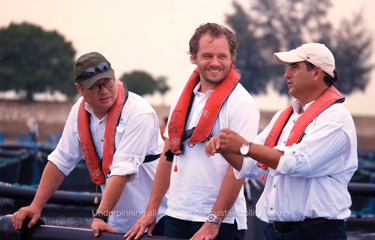Singapore-based Barramundi Group is planning an initial public offering on the Euronext Growth exchange.
Previously known as Barramundi Asia, the company operates three ocean farm sites growing barramundi, and has plans to scale production up to 50,000 metric tons by 2030. It will offer an equity private placement followed soon after by a listing on Euronext Growth, formerly known as the Oslo Børs, which has become the preferred location of aquaculture start-ups seeking public funding.
“A number of prominent institutions and family offices in both the Nordics and Asia have already pre-committed themselves to participate in the transaction,” the company said in a 4 August press release.
Founded in 2008 by an ex-Marine Harvest executives Hans den Bieman and Joep Kleine Staarman, Barramundi Asia now operates farms in Singapore, Northern Australia, and Brunei. Barramundi Group CEO Andreas von Scholten told SeafoodSource in January 2020 the company was mulling an IPO as a means of raising additional capital.
Von Scholten said his company represents a unique business model, as the company prefers to control its entire supply chain, from hatcheries to farms, processing facilities, and a marketing operation. It also has a focus on aquafeed through a partnership with Louis Dreyfus; on animal health through UVAXX, a subsidiary firm that provides custom animal health solutions, including vaccines and fish-health monitoring, to the Barramundi Group’s farms; and in genetics and breeding through its ownership of Allegro Aqua, a Singapore-based start-up founded in 2018 by scientists from Temasek Life Sciences Laboratory, which remains a significant shareholder in the Barramundi Group.
“We’re really truly bringing to fruition the idea of becoming an end-to-end company,” von Scholten previously told SeafoodSource. “It’s because we all really believe in the future of barramundi as a species. Once it becomes more recognized globally, a lot of support companies will emerge, but as of now, there’s really a very limited number of companies specializing in barramundi, so we’ve had to take that on our own and do it ourselves. But the way we think it has to be done is the hard way, the right way, with very high-tech farming and sophisticated support efforts.”
In the 4 August release, the company further outlined its growth targets through 2030, with a plan to expand production at its existing ocean farm sites, expand its market share, pursue new revenue streams, including monetization of its aquaculture technology, and build production partnerships “to pave the way for significant scaling opportunities.”
“This listing is a significant milestone for Barramundi Group as it marks the first step in our plan for transformational growth,” von Scholten said in the 4 August release. “The organic developments we’ve been able to build through the engagement of global brand-name clients and intermediaries in the last few years demonstrate the large commercial potential that resides in barramundi as a premium whitefish. We believe that this listing will enable us to fully capitalize on the growing global middle class and skyrocketing demand for high-quality proteins that are raised responsibly, with minimal carbon and oceanic impact.”
Barramundi Group’s Australian farm, established in 2002, has a current production level of 1,800 metric tons (MT), with a goal of scaling to 3,000 MT by 2026. Its Singapore farm has a current production volume of 500 MT annually, with a plan to scale up to 1,000 MT by 2026, and its Brunei farm, established in 2020, will produce 1,000 MT of barramundi by 2022, moving up to 3,000 MT by 2026. Additionally, the company said it is “in the process of both exploring a significant expansion of the number of leases in Australia as well as potentially entering into new geographies through partnerships and joint ventures.”
Barramundi Group sells its fish in Australia, Singapore, Hong Kong, China, South Korea, Thailand, and the U.S. via its premium online offering, Kühlbarra, as well as under its Cone Bay Barra brands.
Barramundi Group’s decision to pursue a public listing “was driven by the growing global demand for barramundi and the overall consumer trend towards sustainable consumption, which is projected to increase exponentially over the next five years,” the company said.
“With the global population expected to reach almost 10 billion by 2050, the group recognises that there is a significant opportunity for barramundi as a tropical fish species to help address the growing global protein challenge,” it said.
Photo courtesy of Barramundi Group







